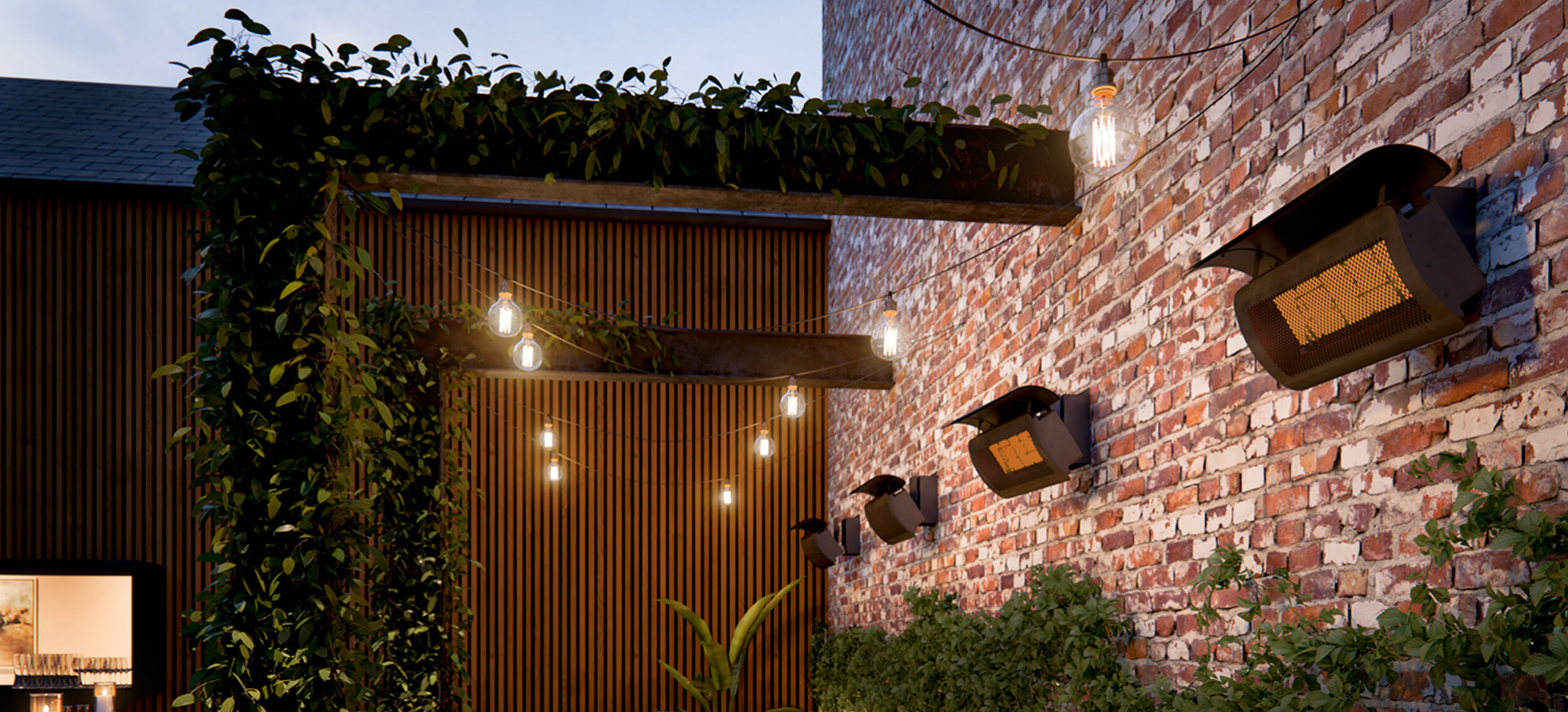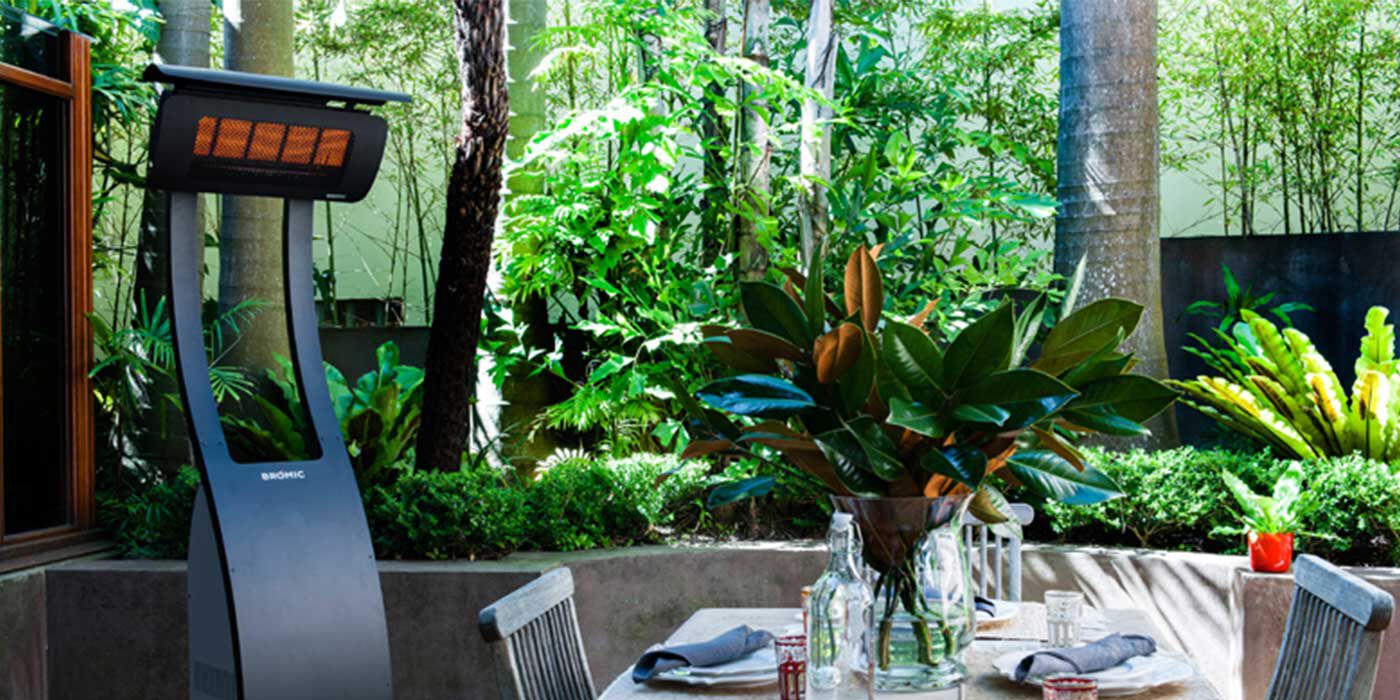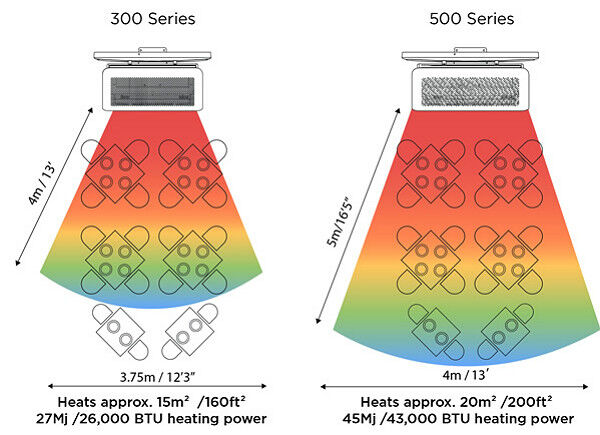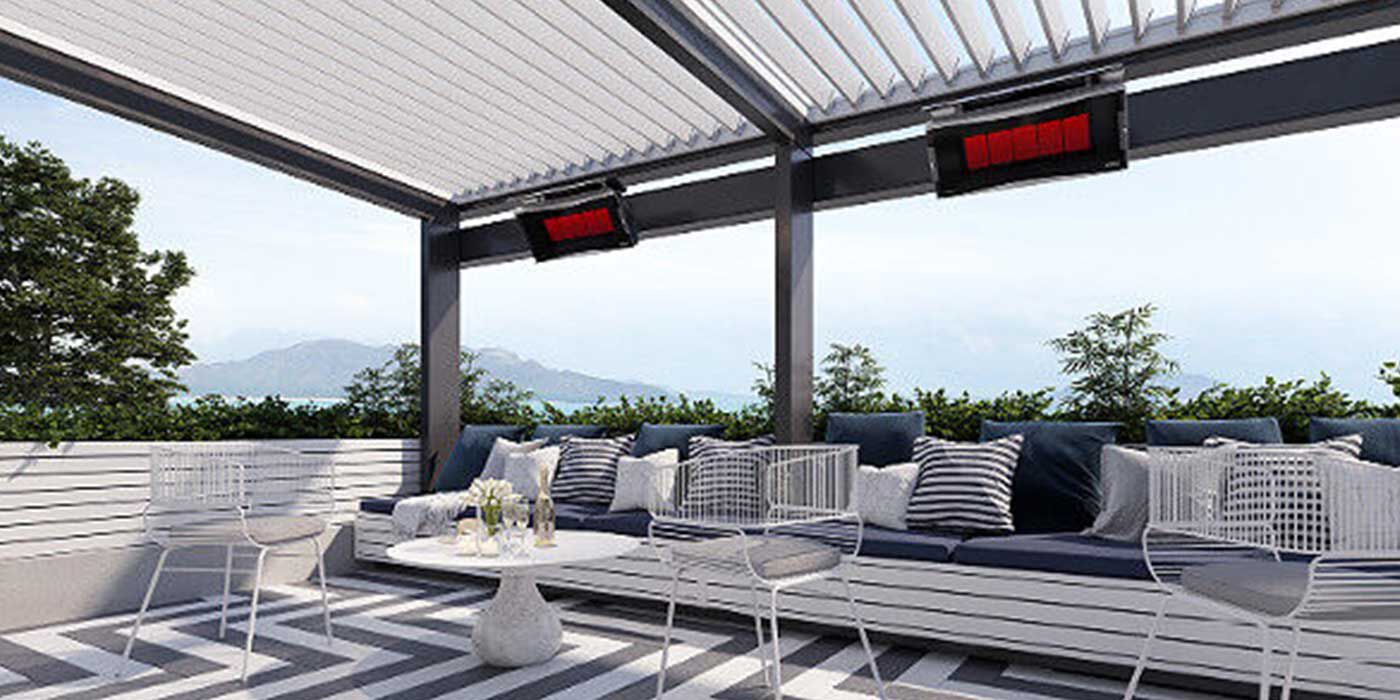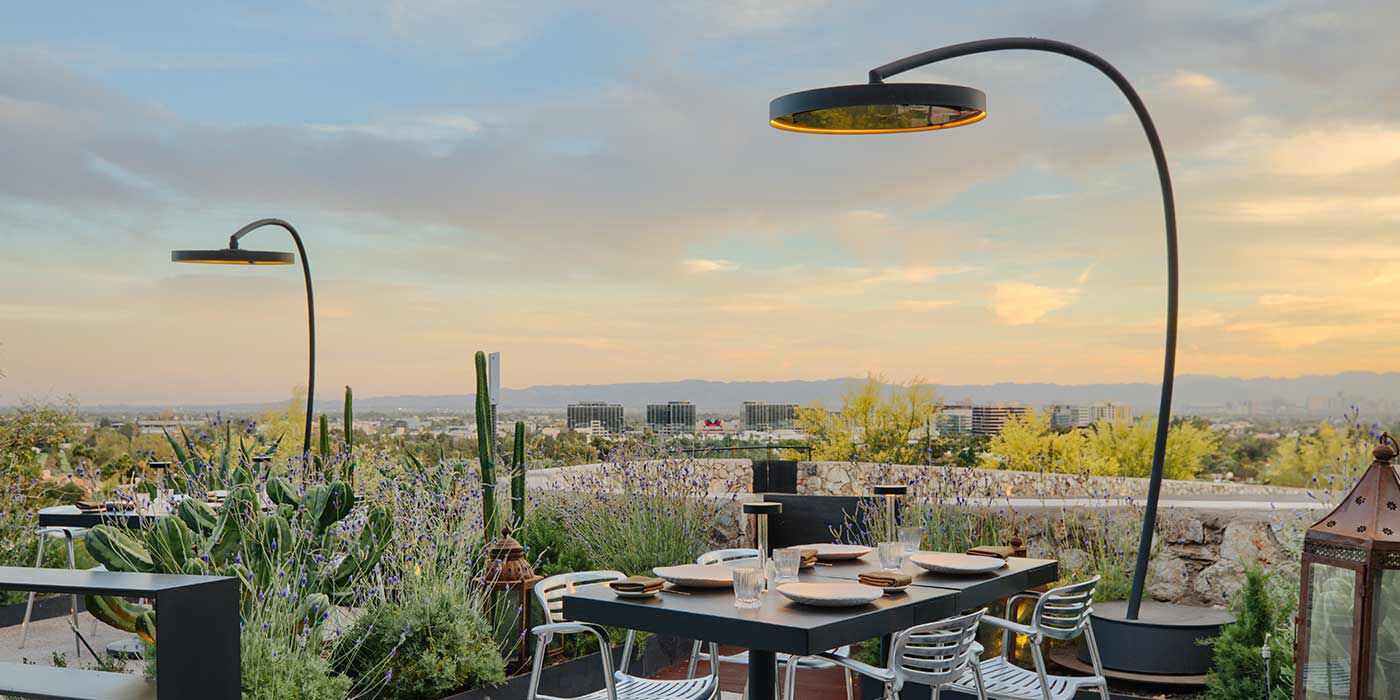By: Nick Janco, NFI Certified Master Hearth Professional
Last Updated: October 22, 2024
Propane patio heaters are an ideal solution for extending outdoor enjoyment as temperatures drop, providing a convenient and efficient source of warmth.
These portable heaters are fueled by Propane gas, offering quick heat distribution to keep outdoor spaces comfortable for gatherings, dining, or relaxation.
In this article, we’ll explore the key features, benefits, safety tips, and maintenance requirements of Propane patio heaters, helping you make the best choice for your outdoor heating needs.
What are the Benefit of Propane Patio Heaters?
- Easy to set up
- Low-maintenance
- Available in both portable and permanent styles
- Large range of sizes – hanging heaters to full-size freestanding units
- Propane tank fits conveniently inside the base of most portable heaters
- Equipped with safety features
- Propane gas is non-toxic and won’t harm water or soil
- Can be professionally installed for permanent use
Installation Requirements & Heat Output
Propane gas is a mobile fuel and doesn’t require special plumbing or installation, making Propane patio heaters a versatile and convenient way to heat your outdoor space.
They have the same instant heat output as Natural gas heaters and can be made permanent if a gas line is installed by a licensed professional.
The power for a gas patio heater is measured in British Thermal Units, or BTU’s for short. BTU’s tell you how much heat a gas appliance will provide (the higher the BTU’s, the higher the heat output).
Propane provides an average of 2,500 BTU’s per standard cubic foot, making it a very efficient fuel source.
A typical full-size Propane patio heater will output 40,000 BTU's and will distribute heat to an area up to 20' in diameter (314 sq ft).
The exact heating range and output will depend on the design of the patio heater, the wind conditions, and the temperature outside.
Cost of Using Propane Patio Heaters
Propane patio heaters are the most expensive to use, compared to Natural gas and electric styles.
The cost of Propane gas is measured in price per gallon. The average portable Propane patio heater, like this model from Bromic, can house a 20-lb. Propane tank (about 4.7 gallons of fuel).
A 20-lb. Propane tank can last up to 10 hours and costs between $15 - $20 to fill up, making the average cost per hour between $1.5 - $2. A typical 40,000-BTU patio heater will cost about $1.70 per hour to use.
Use this simple equation to determine how many BTUs you need to heat your space:
Cubic feet of area x desired temperature rise = BTUs needed
Pro Tip:
A 20-lb. Propane tank holds approximately 430,000 BTUs of liquid Propane. If a heater has a BTU capacity of 40,000 BTUs per hour, the Propane tank will last approximately 10.75 hours (430,000 / 40,000 = 10.75).
Patio Heater Ignition & Control Options
There are two main types of ignitions for gas patio heaters — manual ignitions and automatic ignitions.
Manual ignitions use a control knob to control the flow of gas to the patio heaters. Some manual ignitions have a push button that creates a spark to light the gas, while others have a pilot light that needs to be lit manually.
Automatic ignitions use electricity to control and ignite the gas flow to the patio heaters. The patio heaters can be controlled with an on/off switch or with a hand-held remote control.
Both ignition types have built-in safety systems that are designed to shut off the gas flow to the patio heaters if the flame goes out and can’t be relit.
Safety Considerations
Before installing Propane patio heaters, always consult the owner’s manual to find out the recommended clearance to combustibles (things that catch fire) to determine the proper location for the heaters.
Always maintain these clearances and only use gas patio heaters in an open outdoor space with plenty of air flow.
For the safest options, look for patio heaters that are UL-approved and CSA-certified. These approvals ensure each heater has undergone rigorous testing to verify that they are a reliable and safe heating appliance.
Before using your Propane patio heater, read the installation manual thoroughly, so you know how to set it up and use it properly.
You’ll need to:
- Inspect the heater for damage
- Inspect the Propane tank for damage
- Check gas connections, lines, fittings, and hoses to make sure they are working properly
When you’re finished using your patio heater, always turn the control knob off, disconnect the Propane tank, and store the heater upright in a sheltered area away from the elements.
Always keep heaters out of reach of children and never leave your patio heaters on unattended.
Propane Tank Safety Tips
- Take care when handling a Propane tank to avoid damaging the valves.
- Follow the manufacturer instructions when filling, transporting, installing, and using a Propane tank.
- Always inspect all connections and hoses, before each use.
- Never overfill a Propane tank with fuel.
- Propane tanks should be stored upright.
- Keep them outside, in a cool, dark, well-ventilated area.
- Spare Propane tanks should be kept a minimum of 20 feet away from any patio heaters that are in use.
- To maintain optimal performance, make sure your Propane tank is equipped with a pressure regulator.
- Keep the tank full, and store it away from snow and ice.
How to Detect a Gas Leak
Propane gas is odorless on its own, so a distinct smell is added to it to help you identify its presence. The scent is very strong and unpleasant, similar to rotten eggs.
If you smell Propane gas, you may have a gas leak. Always refer to the owner’s manual for help detecting and repairing a leak.
If you suspect a gas leak but don’t smell gas, do not start your patio heater and follow these steps:
- Prepare a soap solution of equal parts liquid soap and water.
- Liberally apply the soapy water onto the gas connections with a spray bottle, rag, or brush.
- If you see bubbles, there is a leak.
- Turn off the gas supply and tighten the leaking fittings.
- Repeat step 2.
If you still smell gas and can’t find the source of the leak:
- Turn off gas and disconnect it from the heater.
- Turn off lights, appliances, and cell phones (anything that can spark).
- Leave the area and call your Propane supplier, local fire department, or 911.
- A qualified service technician must determine your propane system is completely leak-free before you use any Propane-fueled appliances.
How to Repair a Gas Leak
If you find the source of the leak, make sure the gas is turned off and disconnected from the heater, before attempting to fix it.
To repair the leak, gas lines, hoses, fittings, and/or connections may need to be replaced. Once all leaks have been repaired, the patio heater will be ready for use.
Pro Tip:
Always follow the manufacturer requirements for testing, repairing, and servicing the heater. A licensed professional must repair your heaters. Do not attempt to do it yourself.
Patio Heater Maintenance
Gas patio heaters are easy to clean and maintain. To keep your heater fully functional, inspect all connections before each use to make sure they are clean and in proper working order.
Extreme temperatures and weather conditions can cause unnecessary wear and tear to your patio heaters. You can prevent this and extend the life of your portable patio heaters by storing them in a garage, shed, or barn when they’re not in use.
Covers are also available for portable patio heaters and are recommended to prevent small insects and spiders from nesting in the heaters. Make sure your patio heaters have completely cooled before covering or storing them.
Before cleaning your patio heater, make sure the gas is turned off and fully disconnected. Never disassemble the heater and only clean the outside surface.
Follow the cleaning guidelines provided in the owner’s manual. The manual will tell you how often to clean the heater, along with acceptable products and cleaning techniques to use.
Enjoy Your Outdoor Space All Year Long
We're Here to Help
Do you have more questions for us? Contact one of our NFI certified experts at (800) 919-1904 today!
More Resources
Head over to our Patio Heater Buying Guide to learn even more about patio heaters.
Check out our Patio Heater FAQ Page for answers to the most commonly asked questions about patio heaters.
Read all about electric patio heaters to find the best heater for your space.
 |
Nick Janco is a seasoned Technical Sales Representative with a decade of experience at Woodland Direct. As an NFI-Certified Master Hearth Professional, Nick is dedicated to helping his clients seamlessly integrate fire features into their homes, ensuring every detail is perfectly executed. While he's trained to assist with any fire-related project, Nick specializes in patio heaters. He's helped thousands of satisfied clients find the best heating solutions, offering valuable design, safety, and installation advice. Outside of work, Nick often spends time on the green enjoying a round of golf with his 5-year-old son. Call Nick or one of our experts in fire at 800.919.1904. |
